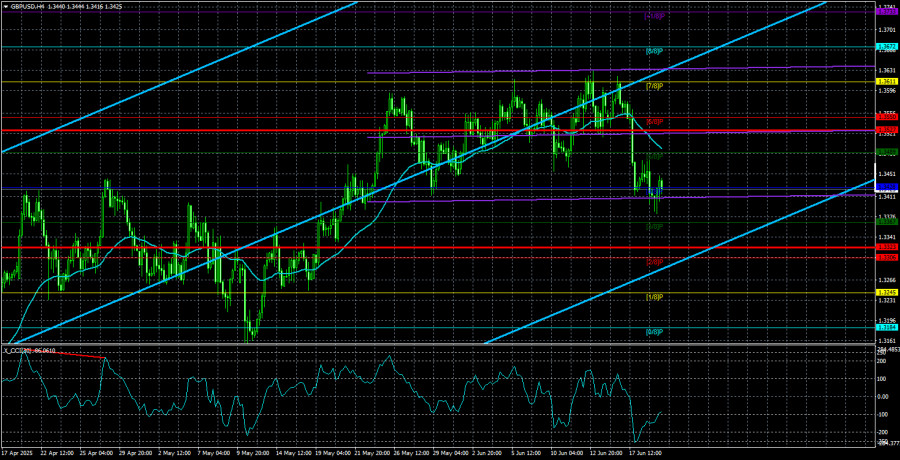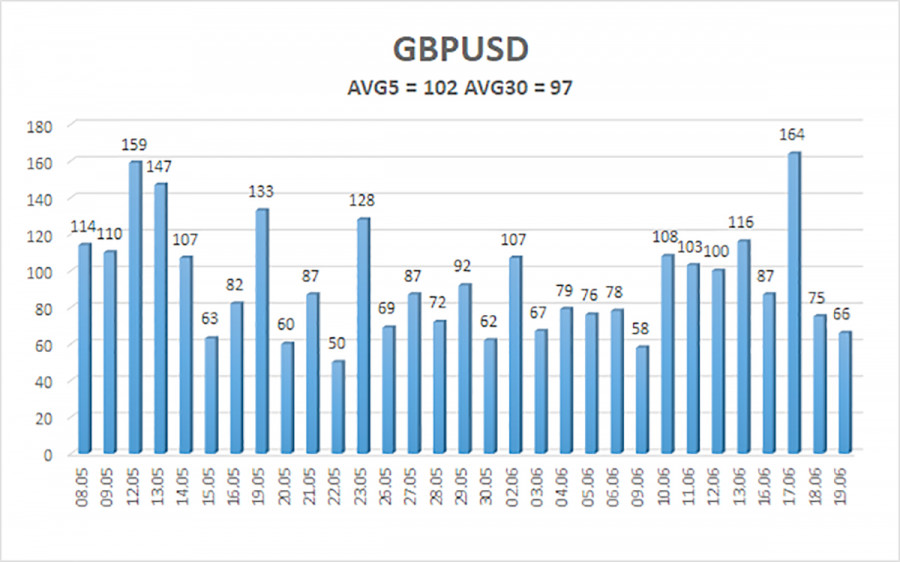อ่านรายละเอียดเพิ่มเติม


 20.06.2025 07:16 AM
20.06.2025 07:16 AMThe GBP/USD currency pair traded relatively calmly on Thursday, given the fundamental backdrop available to the market. On Wednesday evening, the Federal Reserve announced the results of its latest meeting, which can be described as "moderately hawkish." However, nothing surprising is found in its hawkish stance, as the U.S. central bank has maintained this position since last year. It's the market—along with Donald Trump—that persistently expects and demands monetary policy easing from the Fed. The objective reality paints a somewhat different picture.
The following day, the Bank of England released its meeting results, which included even less important information. As expected, the key interest rate remained unchanged at 4.25%, and three members of the Monetary Policy Committee voted in favor of a rate cut. It's worth noting that only two votes for a rate cut had been forecast. Thus, the Bank of England's meeting was slightly more dovish than anticipated.
If we set aside all the secondary data from Wednesday and Thursday, here's what remains: The Fed has not and will not lower the rate until Trump finalizes his import tariff decisions. Possibly on July 9 (when the so-called "grace period" ends), we will learn which countries and how exactly will be subject to the White House's levies and duties. Notably, it's not the countries themselves that will be taxed but rather American consumers, who will end up paying more for imported goods. Still, we shouldn't expect any deals with the EU or China before July 9.
Therefore, we seriously doubt anything will change before the next Fed meeting. As for the BoE, its officials had planned four rate cuts this year. Two have already occurred, but inflation jumped to 3.5% a month ago. It remains well above the target level, so we believe the BoE will pause its easing cycle for more than one meeting.
This means neither the Fed nor the BoE intends to ease policy in the near term. As a result, the monetary policy factor will exert equal influence on both the dollar and the pound in the coming months—especially considering their nearly identical key rates. One might assume that under such circumstances, the dollar would stop falling. However, we must emphasize that the main factor influencing the dollar is Trump, not the Fed. Therefore, the future of the dollar depends entirely on Trump. Unfortunately, his actions are utterly unpredictable, making even short-term forecasts—two weeks ahead—irrational. We can only assume that the dollar will continue to depreciate against all its major rivals—sooner or later—unless Trump's policies soften. At the moment, we see no signs of the trade war ending. A deal with the UK is more in Britain's interest than in that of the U.S. or Trump.
The average volatility of the GBP/USD pair over the last five trading days is 102 pips, which is considered "average" for this pair. On Friday, June 20, we expect movement within the range bounded by the levels of 1.3323 and 1.3527. The long-term regression channel is directed upward, indicating a clear uptrend. This week, the CCI indicator entered oversold territory, which may trigger a renewed upward move.
S1 – 1.3428
S2 – 1.3367
S3 – 1.3306
R1 – 1.3489
R2 – 1.3550
R3 – 1.3611
The GBP/USD currency pair remains in an uptrend, though it is currently undergoing a correction. There is plenty of news supporting this corrective movement. Every new decision by Trump is perceived negatively by the market, while positive news from the U.S. remains scarce. Therefore, long positions targeting 1.3611 and 1.3672 are currently more relevant when the price is above the moving average. If the price consolidates below the moving average, short positions can be considered with targets at 1.3367 and 1.3323. However, the probability of growth is significantly higher than that of a decline. From time to time, the U.S. dollar may show corrective movements, but for a broader rally, it needs clear signs of an end to the global trade war.
Linear Regression Channels help determine the current trend. If both channels are aligned, it indicates a strong trend.
Moving Average Line (settings: 20,0, smoothed) defines the short-term trend and guides the trading direction.
Murray Levels act as target levels for movements and corrections.
Volatility Levels (red lines) represent the likely price range for the pair over the next 24 hours based on current volatility readings.
CCI Indicator: If it enters the oversold region (below -250) or overbought region (above +250), it signals an impending trend reversal in the opposite direction.
You have already liked this post today
*บทวิเคราะห์ในตลาดที่มีการโพสต์ตรงนี้ เพียงเพื่อทำให้คุณทราบถึงข้อมูล ไม่ได้เป็นการเจาะจงถึงขั้นตอนให้คุณทำการซื้อขายตาม
วันนี้ คู่เงินคู่นี้กำลังลดลงสู่ระดับจิตวิทยาที่ 1.3700 นักเทรดได้เพิ่มความคาดหวังต่อการลดอัตราดอกเบี้ยของ Fed ในเดือนกันยายน หลังจากรายงานการจ้างงานนอกภาคเกษตรของสหรัฐฯ เดือนกรกฎาคมที่ออกมาต่ำกว่าที่คาดการณ์ไว้อ่อนแอลง นอกจากนี้ แนวโน้มตลาดในปัจจุบันยังบ่งชี้ว่าจะมีการลดอัตราดอกเบี้ยอย่างน้อยสองครั้ง ครั้งละ 25 จุดฐานก่อนสิ้นปี การคาดการณ์เหล่านี้เป็นตัวขับเคลื่อนหลักของการอ่อนตัวของดอลลาร์สหรัฐในช่วงที่ผ่านมา ซึ่งกำลังสร้างแรงกดดันให้กับ
ความคาดหวังที่ต่างกันเกี่ยวกับนโยบายของธนาคารกลางออสเตรเลีย (RBA) และธนาคารกลางญี่ปุ่นกำลังยับยั้งการเติบโตเพิ่มเติมในราคาจุดซื้อขาย (spot price) ในวันนี้ คู่เงิน AUD/JPY ฟื้นตัวขึ้นหลังจากลดลงในช่วงการซื้อขายของเอเชีย และถึงขั้นที่ระดับสูงสุดของสัปดาห์ เยนญี่ปุ่นยังคงดึงดูดผู้ขายหลังจากที่ธนาคารกลางญี่ปุ่นได้เผยแพร่ความเห็นสรุปจากการประชุมเดือนกรกฎาคมที่เน้นถึงความกังวลของผู้กำหนดนโยบายเกี่ยวกับผลกระทบเชิงลบของการเพิ่มภาษีของสหรัฐฯ ต่อเศรษฐกิจในประเทศ ในเวลาเดียวกัน ภาวะตลาดที่เป็นบวกก็เป็นแรงกดดันต่อเยนในฐานะสกุลเงินที่ปลอดภัย เมื่อเทียบกับเงินดอลลาร์ออสเตรเลียที่มีความเสี่ยงสูงกว่า
เมื่อวานนี้ ค่าเงินดอลลาร์สหรัฐลดลงจากข่าวที่ประธานาธิบดีโดนัลด์ ทรัมป์ ของสหรัฐได้แต่งตั้ง สตีเวน มิรัน ประธานที่ปรึกษาด้านเศรษฐกิจเป็นสมาชิกคณะกรรมการผู้ว่าการของธนาคารกลางสหรัฐ "เขาทำงานกับผมมาตั้งแต่เริ่มต้นวาระที่สองของผม และประสบการณ์ในโลกเศรษฐกิจของเขานั้นหาคนเทียบได้ยาก ผมมั่นใจว่าเขาจะทำงานได้อย่างยอดเยี่ยม" ทรัมป์กล่าว ประธานาธิบดีกล่าวว่า Miran ซึ่งการเสนอชื่อยังต้องได้รับการยืนยันจากวุฒิสภาสหรัฐ จะทำหน้าที่จนถึงสิ้นสุดวาระของผู้ว่าการเฟด
กลยุทธ์ TACO — "Trump Always Chickens Out" — อาจไม่เป็นผลดีต่อ ตลาดหุ้น อเมริกาตลอดเวลา นักลงทุนเชื่อว่าทำเนียบขาวชนะสงครามการค้าด้วยการหลีกเลี่ยงสำเร็จ อย่างไรก็ตาม การยอมประนีประนอมของฝ่ายบริหารของสหรัฐฯ ในเรื่องการจัดหาชิปให้กับสหภาพยุโรป
เมื่อต้นสัปดาห์ที่ผ่านมา ดูเหมือนว่าสมาชิกของ Federal Reserve อีกหลายคนกำลังแสดงท่าทีที่ผ่อนปรนมากขึ้นเกี่ยวกับอนาคตของอัตราดอกเบี้ย อย่างไรก็ตาม เมื่อวานนี้ กลุ่มผู้ที่ไม่เห็นด้วยกับมุมมองนี้ได้แสดงความเห็นของพวกเขาออกมา นายราเฟล บอสติก ประธานธนาคารกลางสาขาแอตแลนตากล่าวในสุนทรพจน์ว่าเขายังมีความเห็นว่าในปีนี้น่าจะมีการปรับลดอัตราดอกเบี้ยลงอย่างหนึ่ง โดยเขากล่าวว่ายังคงมีเหตุผลที่จะสงสัยว่าผลกระทบด้านเงินเฟ้อจากภาษีจะเป็นเพียงชั่วคราวหรือไม่ "คำถามก็คือหากภาษีเป็นมาตรการระยะสั้นเพียงอย่างเดียวหรือว่าอาจจะส่งผลยาวนานและยังอาจก่อให้เกิดการเปลี่ยนแปลงโครงสร้างได้ คำถามนี้ ตอนนี้เป็นคำถามที่สำคัญที่สุดที่เราต้องเผชิญ"
โดนัลด์ ทรัมป์ ยังคงพยายามอย่างเอาเป็นเอาตายในการบีบบังคับประเทศและทวีปต่างๆ ให้ยอมสยบต่อสหรัฐฯ ในฐานะมหาอำนาจโลก ประเด็นภาษียังเป็นประเด็นที่เด่นชัดและกระตุ้นความผันผวนในตลาดที่เพิ่มขึ้น ทำให้หลีกเลี่ยงไม่ได้ว่าจะต้องพิจารณาอย่างจริงจัง คลื่นภาษีหลายระลอกได้ผลักดันตลาดให้เข้าสู่สภาวะที่ไม่เป็นระเบียบ เนื่องจากยังไม่ชัดเจนว่าทุกอย่างนี้จะจบลงอย่างไรในที่สุด อย่างไรก็ตาม แม้ในสภาวะที่ไม่แน่นอนเช่นนี้ นักลงทุนก็ยังคงพยายามหาช่องทางการค้าที่ยังคงมีอนาคตที่สดใส เช่น การตัดสินใจของทรัมป์ในการกำหนดภาษี 100%
ไม่มีรายงานเศรษฐกิจมหภาคที่มีกำหนดเผยแพร่ในวันศุกร์ ดังนั้นการเคลื่อนไหวของตลาดในวันนี้น่าจะค่อนข้างซบเซาและไม่มีแนวโน้มใดๆ อย่างไรก็ตาม สิ่งสำคัญคือต้องจำไว้ว่า Donald Trump ยังคงดำรงตำแหน่งประธานาธิบดีของสหรัฐอเมริกา ซึ่งหมายความว่าอาจมีการประกาศแพ็คเกจภาษีใหม่ได้ทุกเมื่อ หรือประธานาธิบดีสหรัฐอาจตัดสินใจบางอย่างที่สำคัญจนทำให้ตลาดต้องรีบขายเงินดอลลาร์ เพิ่งสัปดาห์นี้เองที่ Trump ได้ปลดหัวหน้าสำนักงานสถิติของสหรัฐฯ เพราะไม่พอใจข้อมูลตลาดแรงงานล่าสุด ไม่มีเหตุการณ์สำคัญทางพื้นฐานที่ถูกกำหนดไว้ในวันศุกร์ อย่างไรก็ตามในช่วงต้นสัปดาห์นี้
ในวันพฤหัสบดี คู่เงิน GBP/USD กลับมามีการเคลื่อนไหวในทิศทางขาขึ้นอีกครั้ง ทั้งที่สถานการณ์พื้นฐานชี้ให้เห็นทิศทางตรงกันข้ามอย่างเป็นทางการ อย่างไรก็ดี เราได้เตือนว่าแม้ว่าการประชุมของธนาคารกลางอังกฤษเป็นเหตุการณ์ที่สำคัญ การตลาดในขณะนี้ถูกขับเคลื่อนด้วยปัจจัยที่แตกต่างออกไปและใหญ่กว่ามาก อันที่จริงแล้ว มีอยู่สามปัจจัย ปัจจัยแรกคือ สงครามการค้าที่ทวีความรุนแรงขึ้นทุกวัน ปัจจัยที่สอง คือ สงครามของ
คู่สกุลเงิน EUR/USD ลดลงเล็กน้อยจากจุดที่สูงขึ้นล่าสุดในวันพฤหัสบดีที่ผ่านมา แต่การเคลื่อนไหวนี้ไม่ได้ส่งผลกระทบที่แท้จริงต่อทิศทางโดยรวมของคู่สกุลเงินนี้ แม้ว่าจะไม่มีข้อมูลเศรษฐกิจมหภาคที่สำคัญในสัปดาห์นี้ แต่พื้นฐานยังคงแข็งแกร่งมาก ผู้ค้าในตลาดยังคงมุ่งเน้นไปที่ปัจจัยพื้นฐานที่เกี่ยวข้องกับสงครามการค้าที่ทั่วโลกได้รับผลกระทบโดย Donald Trump อย่างที่เราคาดการณ์ไว้ ไม่มีการพูดถึงการสิ้นสุดหรือแม้แต่อ่อนแรงของการขัดแย้งนี้ ข้อตกลงทั้งหมดที่ลงนามโดยทำเนียบขาวนั้นเป็นที่พอใจแก่สหรัฐฯ และเศรษฐกิจของตน แต่ไม่ใช่สัญญาณของการอ่อนแรงหรือการหยุดยิง อะไรคือประเด็นหลักที่รวมอยู่ในข้อตกลงที่ลงนามแทบทั้งหมด
ประธานาธิบดีควรมีการตอบสนองเช่นใดในสถานการณ์ที่ตลาดแรงงานกำลังอ่อนแอลง? การเปลี่ยนแปลงนโยบายที่นำไปสู่การลดลงของตลาดแรงงานเป็นคำตอบที่เหมาะสม หลังจากที่ผู้เข้าร่วมตลาดเข้าใจชัดเจนแล้วว่า Nonfarm Payrolls ได้ทำให้เกิดความผิดหวังในช่วงสามเดือนที่ผ่านมา อย่างไรก็ตาม ตามที่ได้กล่าวไปแล้วว่า ทรัมป์ไม่ได้กังวลเกี่ยวกับชาวอเมริกันธรรมดาที่ต้องเผชิญกับปัญหาเงินเฟ้อสูง การลดโครงการสังคมและการรักษาพยาบาลหลายแห่ง การเพิ่มราคาสินค้านำเข้า และสินค้าที่พึ่งพาวัตถุดิบหรือนำเข้าชิ้นส่วนจากต่างประเทศ ดังนั้น ประธานาธิบดีสหรัฐฯ จึงไม่มีแผนที่จะช่วยกู้วิกฤตตลาดแรงงาน
ตารางของ Forex
เวอร์ชั่นแบบ หน้าเว็บไซต์

Your IP address shows that you are currently located in the USA. If you are a resident of the United States, you are prohibited from using the services of InstaFintech Group including online trading, online transfers, deposit/withdrawal of funds, etc.
If you think you are seeing this message by mistake and your location is not the US, kindly proceed to the website. Otherwise, you must leave the website in order to comply with government restrictions.
Why does your IP address show your location as the USA?
Please confirm whether you are a US resident or not by clicking the relevant button below. If you choose the wrong option, being a US resident, you will not be able to open an account with InstaTrade anyway.
We are sorry for any inconvenience caused by this message.


